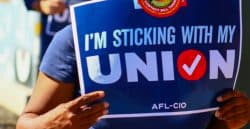An overhaul of the Australian visa system is leading to major changes in the country’s agricultural workforce. With a steady decline of working holidaymakers and an increase of Pacific Islanders and south-east Asians taking up jobs in horticulture, advocates predict a rise in exploitation on Australian farms.
Australia’s visa system shake-up
The number of backpackers working in agriculture is described as a “trickle” compared to pre-pandemic rates, according to the President of the Victorian Farmers Federation, Emma Germano.
Only around 7,000 backpackers had returned to work on Australian farms by February, according to the National Farmers Federation. Before the pandemic, the workforce reached around 40,000.
Although backpackers are still required to work for 88 days, in July of last year, the government expanded the list of jobs they could do. Tourism and hospitality work in northern Australia is now an option for these visa-holders whereas they were previously limited to farming, fishing, mining, construction and bushfire recovery work.
Furthermore, under the new free trade agreement between the U.K. and Australia, British travelers, who previously made up around 24% of the agricultural workforce, no longer have to work for 88 days to renew their visa.
Meanwhile, to address labor shortages in the industry, the government is expanding the new Pacific Australia Labour Mobility (PALM) scheme. There are now 22,400 Pacific Islanders working in Australia – more than double the figure from 2020.
The government has also created a new special agriculture visa to attract workers from south-east Asia, with Vietnam being the first country to join the scheme in March.
But advocates warn that weaknesses within these visa systems could worsen the exploitation of migrant farm workers.
Conditions set to worsen on farms
Many PALM scheme workers have reported exploitation on farms in the past. One worker spoke to Guardian Australia of the tough conditions he experienced. He described the treatment as “appalling” and said that 60 workers were made to share one kitchen with three stoves and three fridges.
He also said he was promised A$25.41 (17 USD) per hour, but then paid on piece rates. He would only make around A$300 (214 USD) from up to 73 hours of work in a week.
From April 28, piece rates will no longer be allowed thanks to the Fair Work Commission ruling that fruit pickers must receive at least minimum wage.
However, even when earning minimum wage, workers are facing unfair wage deductions too. In relation to these deductions, Solicitor Dana Levitt told Guardian Australia:
“This, combined with the government’s failure to adequately regulate the program has resulted in widespread and systemic underpayment of workers, above-market deductions from wages for ‘living expenses’, substandard living and working conditions to name just a few.”
Matt Kunkel, from the Migrant Workers Centre, has raised similar concerns over the south-east Asian visa. He told Guardian Australia:
“People would still be quite closely bound to their employer, providing incredible control on where they live and where they can work. There just won’t be enough support wrapped around this new cohort of migrants. They won’t have an induction about their rights, accommodation, protection – all of these things should be in a new visa class, but they’re not.”
As the workforce on Australian farms changes, the government must take the necessary steps to address existing factors which lead to the exploitation of migrant workers and ensure new visa schemes do not create further vulnerabilities.







Freedom United is interested in hearing from our community and welcomes relevant, informed comments, advice, and insights that advance the conversation around our campaigns and advocacy. We value inclusivity and respect within our community. To be approved, your comments should be civil.